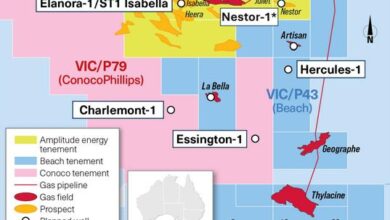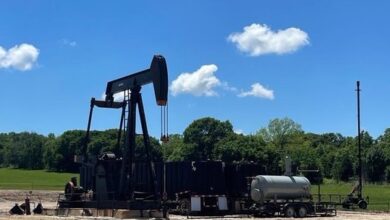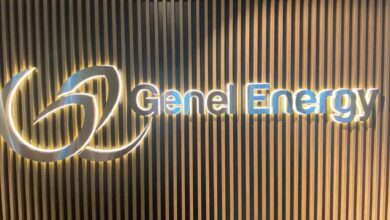US shale drilling positions for survival
As oil prices tumble to stomach-churning lows and E&Ps slash CAPEX budgets one after another, drilling contractors turn their focus to business sustainability in preparation for further drops in the rig count
By Stephen Whitfield, Associate Editor
The COVID-19 pandemic has sent shock waves through the industry over the past couple of months. As the global economy ground to a halt, the outlook for US shale and land drilling has become much less certain. Operators and drilling contractors have scrambled to position themselves for the long haul as best as they can.
- WTI crude prices below $30/bbl could result in a 50% drop in the number of new wells drilled compared with 2019. WTI closed under $20 on 1 May.
- As of 1 May, Baker Hughes’ US land rig count had dropped by 49% from the beginning of this year, to 392.
- In March, 34 out of the 51 public E&P companies active in the US announced a combined $33 billion in CAPEX cuts.
In a market that was already oversupplied, energy demand has now fallen off a cliff, although the full impact will depend on the duration of the pandemic and the scale of government responses. The WTI crude oil price dropped from nearly $50/bbl at the end of February to around $20 by mid-March, eventually reaching a low point of $16.94 on 20 April. On 1 May, the WTI closed at $19.78.
Arindam Das, Group Head of Commercial Advisory at Westwood Global Energy Group, said this drop will undoubtedly affect discretional upstream capital spend and cause financial distress, particularly for highly leveraged and higher-cost producers, such as those in the US shale market. Westwood noted that the outlook for US shale liquids production was still highly uncertain as E&P operators continue to cut spending in light of the new price environment.
Speaking at an event on 12 March – the day immediately after the World Health Organization declared COVID-19 as a pandemic and right on the cusp of the widespread economic shutdown that followed – Mr Das said lower US production could help to reduce market imbalance. “The growth of US shale production is really questionable at this time,” he said. “No one really knows what the pricing is, where it’s going to wind up, and how long this is going to continue.”
Growing uncertainty
Mr Das said several supermajors – ExxonMobil, Chevron, BP, Shell and Total – had improved their operating and free cash flows from 2017 to 2019 thanks to two main drivers: capital discipline in a number of areas, including E&P spending, and supplier rationalization, the process of shrinking the supply base and streamlining their spend among a smaller group of suppliers. In a normal environment, Mr Das said, this would be an indicator of a near-term surge in investment.
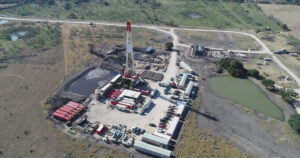
“You asked yourself, as we went into 2020, is this a new investment cycle? Are we in a position where we would reinvest back in the industry? In most logical cases, we’d say yes. That’s where we should be. But, given what’s happened in 2020, we think 2020 is not going to be that year,” he said.
Due to the dramatic market uncertainty caused by COVID-19 over the past couple of months, intense capital discipline will continue to be the order of the day for operators this year. That message can be clearly seen by the number of E&P companies announcing significant budget cuts since early March: Westwood reported in March that 34 out of the 51 public E&Ps active in the US announced a combined $33 billion in CAPEX cuts.
The price war between Russia and Saudi Arabia has only added to the uncertainty facing the market. Following a breakdown in communication between OPEC and Russia over proposed production cuts, Saudi Arabia announced on 8 March massive discounts to its official selling prices. That move helped spark an oil price freefall.
On 12 April, the two countries, working in conjunction with the US, announced a deal to slash production by 9.7 million bbl/day of oil in May and June, approximately 10% of global production. The move did not have an immediate impact on the WTI crude price, but its long-term impact remains to be seen.
Todd Bush, Head of Onshore at Westwood, said at the 12 March event that E&Ps are under enormous pressure. Permian operators had mostly been able to generate free cash flow for the past three fiscal quarters, but operating at a positive free cash flow will be challenging moving forward, even for the top Permian independents.
He added that Westwood is looking at frac crew utilization as a measure of financial health for Permian independents. For example, he noted Diamondback Energy and Concho Resources reduced their planned frac crews almost immediately after the initial oil price drop in early March, following the onset of the Russia-Saudi dispute. “Some of those long-term contracts (between operators and frac companies) aren’t exactly long term. They’re more in the six- to 12-month range, so we expect to see more E&Ps draw down their rigs and draw down their frac crews in the response to lower prices,” Mr Bush said.
Contractor response
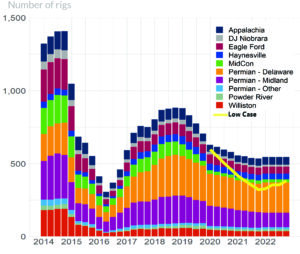
Jody Helbling, General Manager and Partner at Energy Drilling Company, a contractor with rigs operating primarily in states along the US Gulf Coast, said his company is navigating difficult terrain.
In the immediate aftermath of the virus outbreak, six operators postponed or canceled future rig deals that had not been formally signed yet, Mr Helbling said. Another operator inquired about shutting down a well on which Energy Drilling was set to install surface casing, concerned that state or federal government social distancing orders may prevent timely work on the well. Although that concern did not come to fruition, as of late April, only one of the company’s seven rigs was contracted out past that month.
As the outbreak reverberated throughout the US in February and March, Mr Helbling said a lack of clarity from the government on potential movement restrictions exacerbated the caution in some operators’ planning. However, that situation has since improved, with both operators and drilling contractors having a better understanding that social distancing, in some form, may be the norm for a longer period of time.

In the interim, drillers are focused on doing whatever it takes just to survive.
“Now that commodity prices have declined to unprecedented levels and world supply is at a record level, I think we realize that we’re going to be in this for at least another year, and that’s huge for us,” Mr Helbling said. “The whole market has changed. The short-term strategy for drilling companies is just survival. You’ve got to figure out how you’re going to get through this. I think it’s going to be about trying to make the best with what you’ve got.”
In mid-April, Energy Drilling Company received a loan under the Paycheck Protection Program, a COVID-19 relief fund from the US government. The program provides small businesses with a loan totalling eight weeks of payroll, plus benefits, that allows them to retain employees during the economic slowdown. Mr Helbling said the loan has allowed Energy Drilling Company to keep a few employees paid, but the company cannot fully recover until it secures additional drilling contracts.
“Even with the loan, we only brought back 15 people,” he said. “I’ve only got one rig working, so that’s 120-130 people not working. There’s only so much we can do when the rigs and the fabrication yards are down.”
Precision Drilling currently has 75 rigs running in basins across the US and Canada, with contracts ranging from six months to more than two years. On 24 March, the company announced it was reducing its 2020 capital expenditure by approximately 50%, from $95 million to $48 million, and that further adjustments may be considered depending on activity levels as the year progresses.
The company said it would continue to focus on optimization and customer interface with its technology offerings this year, but it will temporarily scale back plans to roll out additional systems on its AlphaAutomation technology platform, which saw a full commercial launch in November. The open platform was designed to host multiple drilling performance applications, regardless of whether they were developed in-house or through a third party.
Fawzi Irani, Vice President of Sales and Marketing at Precision Drilling, said that the coronavirus and the oil price crash have forced the company to reevaluate its 2020 plans.
“Most companies were already driven to protect their balance sheets and free cash flow in the first place,” he explained. “When you couple that with the coronavirus and the OPEC+ breakdown, it adds further complexity to something that was challenging to begin with. We’re still focused on our business continuity plans and implementing these procedures in light of the disruptions to our activity.”
Oil price projections

At its 12 March event, Westwood laid out three potential oil price scenarios for the medium-term future: a base case, which was calculated prior to the escalation of the pandemic; a revised base case; and a revised low case. Mr Das clarified that the models are not hard-lined predictions of the oil price but rather scenarios that provide insight into the potential impact that COVID-19 will bring on the oil price.
Westwood’s pre-COVID-19 base case projected that WTI would average $65/bbl in 2020 before moving to $67 in 2021 and 2022. Its revised base case, from early/mid-March, shows that WTI would average $40/bbl in 2020, $50/bbl in 2021 and $60/bbl in 2022. In this scenario, Mr Bush said US operators would be forced to cut back their drilling and completions (D&C) spending and it would take a sustained WTI level of $60/bbl or more for them to revert to aggressive D&C programs.
Further, the number of wells drilled in US unconventional basins in this revised base case scenario with a $40 WTI would hover around 10,000 in 2020, which would represent a 29% drop from 2019.
Westwood also completed a revised low-case scenario, under which the WTI price would average $30/bbl in 2020, $35/bbl in 2021 and $40/bbl in 2020, then flatten out over the next two years. If this scenario plays out, then Westwood expects a further 15-20% drop in completion activity compared with its pre-COVID base case for horizontal wells in the Lower 48 this year.
“What we’re anticipating with the low case is, if the coronavirus has a longer-term impact – and there’s a lot of discussion on when there might be an easing of restrictions – then you could see a rough 2020 for Permian E&Ps and other US-based E&Ps,” Mr Bush said. “But many of those operators already have hedges, and we think we’ll see some benefit from that. As we look at hedges, as we look at the positioning for those E&Ps in the Permian and other plays, we still think there’s a large market.”
With the WTI staying below $30 heading into mid-April, activity levels have dropped to their lowest point since 2016. In early April, Westwood estimated that sub-$30/bbl WTI would result in a 50% drop in new wells drilled in 2020 compared with 2019.
The industry remains both optimistic and hopeful, however, that capital will flow back into the drilling market when commodity prices improve.
“The pace of capital that will come back to the industry will depend on the pace of recovery, and it’s very basin- and operator-dependent,” Mr Irani said. “You’ve got many factors coming into consideration like inventory and storage levels, access to takeaway infrastructure, hedge positions and so on.”
Rig count shift
Baker Hughes reported the US land rig count at 392 for the week ending 1 May, a 49% drop from the beginning of the year. Speaking in mid-April, Mr Bush said the US land rig count could drop to 315 by the end of the year if the WTI stays below $30/bbl.
Mr Helbling said he believes the price drop could have a more significant impact, taking the rig count down way below what industry saw in 2015 and 2016. “I’ve heard estimates for land rigs as low as 200,” he noted. “It’s possible, but I’m hoping that’s a pessimistic number.”
At Precision, Mr Irani said he thinks it is too early to project the rig count because the impact of the global shutdown and supply/demand shock have not been fully realized. “I’ve seen bands of projections for US land rigs ranging from as low as 200 rigs to as high as 500 rigs,” he said. “Certainly the activity projections are softer than they were going into the year. We’re responding to the current market conditions. We are focused on the safety of our people and on continuing to strengthen our AlphaAutomation technology offering. When the market rebounds, we’ll be well positioned for it.”
As rig counts drop, so will frac activity. Active frac crews are expected to drop by 14% from Q3 2019 to Q1 2020, according to Mr Bush, although he noted that operators will be able to rely on increased fracking efficiencies to help with production. From 2018 to 2019, frac operations showed a 24% rise in efficiency, driven by a significant jump in stages per frac spread in the Mid-Continental Basin, Haynesville Shale and the Eagle Ford. Mr Bush said he expects to see operators focus even more on those metrics in the coming months as they look to maximize their workflows.
“The last two years have been very good for E&Ps in terms of driving costs down and increasing the number of stages per frac spread,” he said. “From that perspective, I think you’ll see operators take in the lessons learned from each area and really hone in on driving the costs down on the completions side with some of these efficiency benchmarks that are becoming more widespread across operators.” DC


